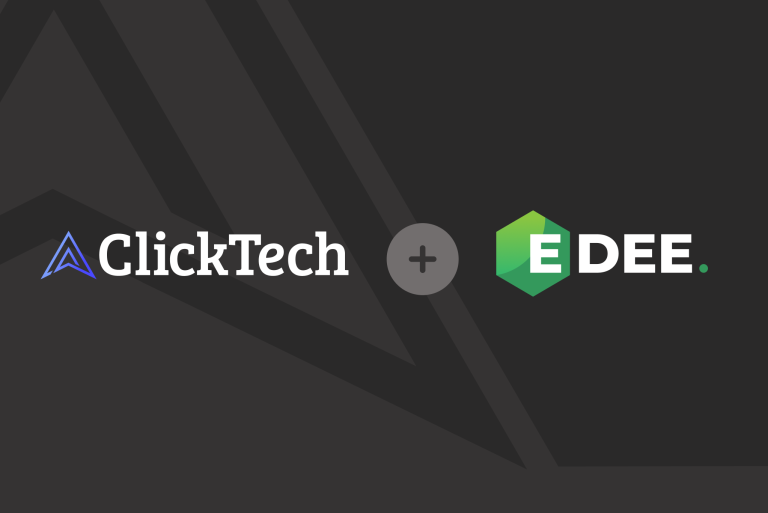TL;DR
- SEO is a tricky, slow-acting beast. It can take time to see results.
- If you’re not ranking for a keyword, you need to make sure your website hits Google’s quality guidelines.
- Keep an eye on your domain authority and make use of EAT to guide your content.
- Look at what websites are ranking and assess if you’re targeting the right keywords.
There are over 63,000 Google searches being made every single second. That’s on a scale that’s just impossible to comprehend.
There is one key thing that you should take from this stat: potential.
With all these searches happening every second, there’s always the potential for your audience to find your business online.
If you’re at the top of these searches, there’s no limit on how many customers you’ll reach and bring to your website. SEO (Search Engine Optimisation) is how you do this. That’s why 57% of B2B marketers say that SEO generates more leads than any other marketing initiative.
The biggest problem with SEO that it’s slow. You’re never going to get instant results from it and sometimes it can be hard to know if what you’re doing is actually making a difference or not.
The question
Which brings us onto today’s question…
“Dear Adzooma,
I run a tattoo parlour that’s just off the high-street in my local town. We don’t get much natural footfall for our location, so we used to rely on word of mouth to get new customers. But recently I’ve been building our store online to get more new customers.
I’ve added a lot of content to try and rank for relevant keywords about the individual services that we offer over the past few months. But it’s been a long process and we’re keen to see if any of it has made a difference. However so far nothing seems to have changed.
It’s frustrating and after investing so much time and resources already, I’m unsure of what the next steps are.
So, why I am not ranking for my keywords?
Thanks!”
Mylene
Thanks for getting in touch, Mylene!
You’re not the only business to be in this scenario. SEO can be a deliberately tricky and slow-acting beast. Especially when Google keep their cards especially close to their chest about what factors actually contribute to their algorithm.
You can’t blame them for that though. If everyone knew exactly the algorithms work, then anyone could cheat the system. The SERPs would be like the Wild West.
There are some rules. There are some guidelines. But when you’re trying to improve your rankings, it’s hard to tell what is holding you back.
So let’s start your step-by-step troubleshooting guide.
How’s your website doing?

Even if you’ve done everything right and got each technical detail set, if your website isn’t up to scratch, it won’t rank.
Google puts its users first. That means making sure that only quality, relevant websites end at the top of the search results. Think about it. Let’s say you want a copy of David Bowie’s albums on vinyl. If you Googled ‘David Bowie Vinyl’, you’d expect to see a list of places that sell the exact thing you’re after.
However, if you made that search and only found fan-websites that slandered David Bowie as an artist or un-trustworthy sellers that want your credit card information for “100% authentic Davies Bowtie vinyls”, you wouldn’t be impressed.
If Google only served these results, you’d go elsewhere.
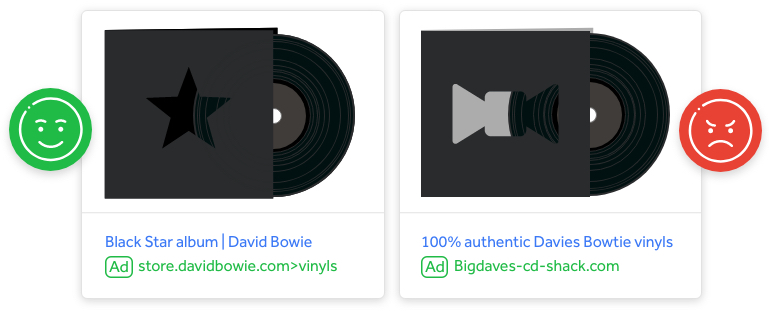
Quality websites are rewarded better than anyone. If you’re struggling to rank, it’s time to look at your website as a whole. Not just your keywords.
Step 1: Check your domain authority
Your domain authority (DA) is basically a fancy metric that shows how trusted your website is. It was created by Moz and scores your website from 1-100.
It’s important to mention domain authority is not a Google-approved metric and they do not use it in their algorithms, and it won’t directly affect ranking. DA is an approximation based on multiple factors and shouldn’t be taken as a perfect measure of a website.
But it does give an indication of where you stand and where to improve.
Just don’t set your sights on that 100 mark. It’s almost impossible to get your rating this high due to how the system works. Also, no two websites are the same. If you’re looking to improve your DA, you should look at other sites in your niche and what their scores are. If they’re all below 50, that’ll be your “ceiling”.
Secondly, it’s not all in your control. If a website that ranks higher does well, you might be proportionally lowered. That’s because no website can go over 100. So the scale is recalculated to accurately show everyone’s position.
Want to find out your DA? Download the free MozBar Chrome extension for an up-to-date look at your domain authority and probability to rank for your keywords.
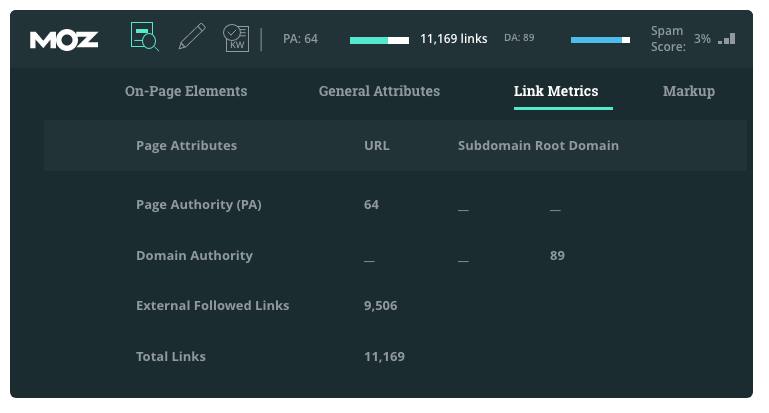
Step 2: Review your content
My colleague once so eloquently wrote:
“If a website’s design is the bones, the words are the flesh”.
I love that image. Professional flattery aside, the point of this quote is that your content is the most important part of your website. It’s the juicy meat that draws visitors in, tells them the full story and pushes them into action.
Without content, you’ll just have a useless skeleton.
Google’s own Andrey Lipattsev stated that high-quality content and link building are the most important factors used for ranking. Now, I’ll cover link building later on. But in terms of quality content, you’re left with just one question.
What do they mean by quality?
Quality is an annoyingly vague term that can cover lots of areas. If quality means enjoyable or entertaining, there’s no way to measure that. If it means that it’s factual, it might be dry, bland and completely unreadable.
To clear this up, Google came up with a delicious quality concept: EAT. (Ha, delicious and EAT! Get it?!).
E-A-T stands for Expertise, Authoritativeness and Trustworthiness. Yeah… it’s not the most engaging acronym in the world.
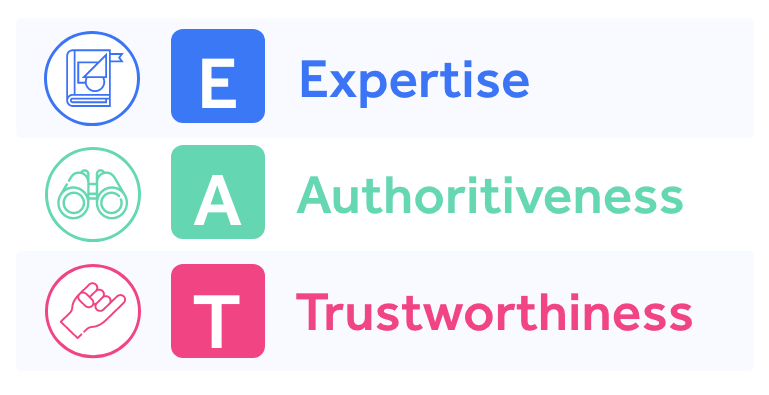
In more detail:
- Expertise. This is, surprisingly, all about being an expert in your industry. It’s showing that you’ve got the credentials, experience and knowledge on your industry. And no, you don’t need formal certificates for this. Google’s “everyday expertise” counts those with life experience as experts.
- Authoritativeness. This is all about how others perceive you and how well your brand is recognised in your industry.
- Trustworthiness. This is about providing trustworthy, honest and true information to your visitors. No lying or trying to deceive people. Just straight up facts (sourced if relevant) and the good old honest truth.
The TL;DR? Create relevant content that answers customer questions.
If you haven’t already, it’s also worth checking through Google’s Webmaster guidelines.
What websites are ranking?

If you’re not ranking – who is?
Look at the websites that are ranking for the keywords. Now, we’re not going to encourage copying the competition but it’s useful to know who you’re actually fighting against and what they’re doing.
Is it mostly blog posts? Videos? Sales pages? Find out what they are ranking for and figure out how you can use this on your own website.
Generally, the more content you have, the better it is for your business. 47% of consumers view 3-5 pieces of content before talking to a salesperson.
If they’re all global companies, like Nike, Apple, or Amazon, then chances are you’re not actually going to beat them. Sorry!
In this case, you may need to track and change new keywords. Use SEMRush’s Keyword Magic Tool – the tool shows you what keywords your competitors are bidding on and generates over 2 million keyword ideas for your SEO and PPC campaigns. You’ll also be able to see what keywords face less competition. While you’re going this, make sure you consider search intent.
When you do this, also consider keyword intent in your research. No one will ever Google things for fun. They do it because they have a specific purpose in mind, whether that’s to get information, to find something, to compare products or to buy.
Search intent is summed up pretty nicely in these categories:
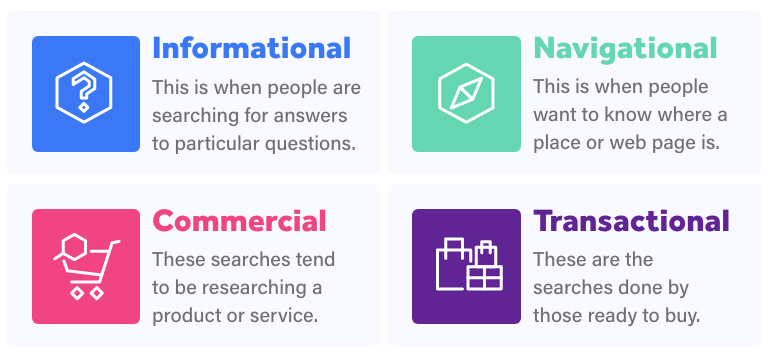
It’s also worth considering long-tail keywords with low search volumes. That might sound counter-productive, but if they’re really niche and there’s little to no competition, you’re more likely to rank at the top and grab yourself a better ROI.
You can also use Adzooma’s SEO Performance Report to see where your website ranks for selected keywords as well as other phrases that you might not be aware of. The report is available to Adzooma users, try the basic version for free to get a taste of what this report can offer. Not an Adzooma user? Sign up for free, here.
The bottom line here?
- Make sure you’re trying to rank for keywords that aren’t heavily competitive
- Have an intent that matches your business needs
- Establish yourself in your industry niche.
Nail these three and your rankings will improve.
Good content marketing can generate quality backlinks
You run a tattoo parlour, Mylene. That means your aim is to get more people to visit your parlour and get tattoos. But you might not want to write about your parlour all the time and that’s fine. So you could write about the best tattoos you’ve ever seen or where the word tattoo came from.
This is called content marketing. You’re writing about your industry without directly selling your product. It shows you’re an expert in your field and builds trust in your services and your overall brand. After all, you’re the one with a tattoo needle in your hand – they need to trust you!
Content Marketing Institute found that 72% of marketers say content marketing increases engagement. Now, you’re not a marketer by trade but if you’re writing the content, this applies to you. Increased engagement = increased opportunity to gain customers.
Content promotion
But once it’s written, never let your content just sit there and go to waste.
If you’ve written a great piece of content, get the word out. Push it out across your social accounts and get people reading it. If you can, get people to link back to it. Backlinks are incredible for your SEO. They help improve your authority and tell Google that your website is one to be trusted. This will help push you into the top 10.
Just don’t get totally caught up on the links though. They’re important, but not the only ranking factor to focus on.
It’s more important to make sure you’ve created a quality website with content that your users trust and find value in. This is how you rank for a keyword.
Once that’s done, it just takes time to see results.
All the best,
Katherine.



